#Coeval Age
Explore tagged Tumblr posts
Text
youtube
TODAY IN PHILOSOPHY OF HISTORY
Further Elaborations on the Coming Coeval Age
An essay of mine, “The Coming Coeval Age,” has just appeared in Isonomia Quarterly for summer 2024. This essay isn’t specifically about philosophy of history, but it does touch on some philosophical problems, so I will consider some of these problems in the context of philosophy of history. In particular, I will discuss the relative complexity of terrestrial history, which is the simplest history possible in a relativistic universe. When we have access to different inertial frames of reference, and the ability to travel between then, history will be dramatically complexified.
Nielsen, J. N. (2024). The Coming Coeval Age. Isonomia Quarterly. Volume 2, Issue 2.
Essay: https://isonomiaquarterly.com/archive/volume-2-issue-2/the-coming-coeval-age/
Quora: https://philosophyofhistory.quora.com/
Discord: https://discord.gg/r3dudQvGxD
Links: https://jnnielsen.carrd.co/
Newsletter: http://eepurl.com/dMh0_-/
Video: https://youtu.be/fvmCoRrBiEs
Podcast: https://spotifyanchor-web.app.link/e/xkVzIKAcIJb
Text post: https://geopolicraticus.substack.com/p/the-coming-coeval-age
#philosophy of history#youtube#isonomia#space exploration#spacefaring civilization#civilization#futurism#coevalism#Coeval Age#Youtube
2 notes
·
View notes
Text
100 "Beautiful" Words
for your next poem/story
Accouchement - the time or act of giving birth
Allemande - a dance step with arms interlaced
Anent - about, concerning
Anthophilous - feeding upon or living among flowers
Aphyllous - destitute of foliage leaves
Apophenia - the tendency to perceive a connection between unrelated things
Apoplectic - extremely enraged
Badinage - playful repartee; banter
Belaud - to praise usually to excess
Chromophil - staining readily with dyes
Coeval - of the same or equal age, antiquity, or duration
Cognoscente - a person who has expert knowledge in a subject
Cruciferous - any of a family of plants including the cabbage, turnip, and mustard
Deliquescent - tending to melt or dissolve
Diallelus - a reasoning in a circle
Elide - to leave out of consideration
Emulous - inspired by or deriving from a desire to emulate
Epergne - an often ornate tiered centerpiece consisting typically of a frame of wrought metal (e.g., gold) bearing dishes, vases, or candle holders or a combination of these
Epexegesis - additional explanation or explanatory matter
Fructify - to bear fruit
Funambulism - a show especially of mental agility
Galbulus - a spherical closed fleshy cone of thickened or fleshy peltate scales
Grenadine - an open-weave fabric of various fibers
Haematite - a reddish-brown to black mineral consisting of ferric oxide, constituting an important iron ore, and occurring in crystals
Hyaline - something that is transparent
Ianthine - having a violet color
Impresa - a device with a motto used in the 16th and 17th centuries; emblem
Ineluctable - not to be avoided, changed, or resisted
Indite - to put down in writing
Jacinthe - a moderate orange
Jiqui - a Cuban timber tree with hard wood very resistant to moisture
Kincob - an Indian brocade usually of gold or silver or both
Kvell - to be extraordinarily proud
Labret - an ornament worn in a perforation of the lip
Lachrymator - a tear-producing substance (such as tear gas)
Latericeous - of the color of red brick
Legerity - alert facile quickness of mind or body
Limnology - the scientific study of bodies of fresh water
Logorrhea - excessive and often incoherent talkativeness or wordiness
Maieutic - relating to the Socratic method of eliciting new ideas from another
Maquillage - makeup
Marmoreal - of marble
Matronymic - a name derived from that of the mother or a maternal ancestor
Mazarine - mazarine blue; a deep purplish blue
Mirifical - working wonders
Nacarat - geranium lake (i.e., a vivid red)
Nephology - a branch of meteorology dealing with clouds
Notabilia - things worthy of note
Obnubilate - becloud, obscure
Obstreperous - marked by unruly or aggressive noisiness
Oenology - a science that deals with wine and wine making
Ombrophilous - capable of withstanding or thriving in the presence of much rain
Organdy - a very fine transparent muslin with a stiff finish
Palafitte - an ancient dwelling built on piles over a lake
Pareidolia - the tendency to perceive a specific, often meaningful image in a random or ambiguous visual pattern
Peregrinate - to travel especially on foot
Peristyle - an open space enclosed by a colonnade
Perse - of a dark grayish blue resembling indigo
Personalia - biographical or personal anecdotes or notes
Phylactery - amulet
Piacular - sacrificial, expiatory
Pleonasm - the use of more words than those necessary to denote mere sense; redundancy
Poetomachia - a contest of poets; specifically: a literary quarrel of Elizabethan dramatists
Prasine - having the green color of a leek
Prestidigitation - sleight of hand
Psilanthropy - a doctrine of the merely human existence of Christ
Psychomachy - a conflict of the soul
Quaesitum - something sought for; end
Quatenus - in the quality or capacity of
Rebarbative - repellent, irritating
Rhapsodize - to speak or write in a rhapsodic (i.e., extravagantly emotional) manner
Rheophilous - preferring or living in flowing water
Rupestrian - composed of rock
Salmagundi - a heterogeneous mixture; potpourri
Sanative - having the power to cure or heal
Sciaphilous - thriving in shade
Subitaneous - formed or taking place suddenly or unexpectedly
Tellurian - a dweller on the earth
Tergiversation - evasion of straightforward action or clear-cut statement
Terpsichorean - of or relating to dancing
Threnody - a song of lamentation for the dead
Tilleul - a pale greenish yellow that is very slightly paler than primrose green
Tmesis - separation of parts of a compound word by the intervention of one or more words
Toadstone - a stone or similar object held to have formed in the head or body of a toad and formerly often worn as a charm or antidote to poison
Toxophilite - a person fond of or expert at archery
Transmogrify - to change or alter greatly and often with grotesque or humorous effect
Ubiquitarian - belief that as Christ is omnipresent his body is everywhere (as in the Eucharist)
Urtication - to induce hives
Vicissitudinous - marked by or filled with vicissitudes (i.e., the quality of being changeable)
Videlicet - that is to say; namely
Visitant - visitor; especially: one thought to come from a spirit world
Wallydraigle - a feeble, imperfectly developed, or slovenly creature
Waltherite - a mineral consisting of an ill-defined carbonate of bismuth having green to brownish green doubly terminated prismatic crystals
Xyloid - resembling wood
Xylomancy - divination by means of pieces of wood
Xystus - a long and open portico
Yfere - obsolete: together
Zoism - phenomena of life are due to a peculiar vital principle
Zymology - a science that deals with fermentation
Zymurgy - a branch of applied chemistry that deals with fermentation processes (as in wine making or brewing)
If any of these words make their way into your next poem/story, please tag me, or send me a link. I would love to read them!
More: Lists of Beautiful Words ⚜ Word Lists ⚜ Writing Resources PDFs
#beautiful words#word list#writeblr#langblr#linguistics#spilled ink#writing reference#dark academia#writing inspiration#creative writing#literature#writers on tumblr#poets on tumblr#writing prompt#poetry#light academia#writing ideas#writing resources
360 notes
·
View notes
Text
Headcanons, re: Melkor's and Manwë's origins and relation
So when it comes to Melkor and Manwë I find myself in a bit of a "headcanon dilemma". On one hand, I really like the idea of them being twins, but on the other hand, a lot of stuff that I personally hc regarding their interpersonal dynamic and conflict rests on the basic assumption that Melkor is older than Manwë - not too much, as in not on the same level as I hc for the Fëanturi (with Námo practically raising Irmo), but a noticeable, significant amount. Enough for Melkor to have spent some time alone with Eru, let's say.
(Side note: I am aware of that one line stating they were coeval. What I'm going to say next will address how I'm trying to solve that conflict and afterwards I'll cycle back to it to explain why I felt like deviating from it/not taking it as literally.)
I've been rotating this back and forth in my head for a while, trying to figure out how I can fit these two ideas together, and what occurred to me now are two things:
The Timeless Halls. Timeless. Time doesn't exist as we know it there ("Then those of the Ainur who desired it arose and entered into the World at the beginning of Time" - Valaquenta)
Ainur are made from Eru's thoughts ("and Eru made first the Ainur, the Holy Ones, that were the offspring of his thought" - Ainulindalë)
With this in mind, as well as the fact that Ainur are spirit beings in general and exist outside of most "biological realities" (for lack of a better term) that inform the relations and interactions between incarnate beings, I think that Ainur twins don't have to be the same age. While coeval is defined as "of the same or equal age, antiquity, or duration" (source: Merriam-Webster), therefore having a clear temporal dimension to it, I would say that, under the above mentioned circumstances, such a notion would be more vague, have less clear boundaries.
(Personally, I see all of the Aratar as more or less "coeval", with the non-Arata Valar being a sort of "second generation" or "later additions" if you will, and the Maiar being made some time after them. My headcanon is that Eru had no plans to raise every single Ainu individually and only did so for the oldest Aratar, later relying on them and subsequently the other Valar and older generation of Maiar to raise and teach the young Ainur (and yes, parentification is a thing and yes, in real life it's a problem).)
Now cycling back to my original "issue" with the coeval line (not really, but just the reason why I wanted to read it a little differently), I felt like it was a bit... strange? thematically. Again, the part of Melkor and Manwë being essentially the evil and good twin is a dynamic I really like, but they're "made" from rather different "blueprints".
While Manwë has a special position as the Elder King, the other Aratar are his peers ("Though Manwë is their King and holds their allegiance under Eru, in majesty they are peers" - Valaquenta) and he's very much like any other Vala in the sense that he has one particular domain that informs his nature and where his talents lie and outside of that he relies on cooperation with his fellow Valar.
Melkor on the other hand (though don't get me wrong, he wasn't supposed to never go without any sort of collaboration or support) is special in the sense that he has a share in the other Valar's domains ("To Melkor among the Ainur had been given the greatest gifts of power and knowledge, and he had a share in all the gifts of his brethren." - Ainulindalë) and he's so vastly more powerful that he was able to hold his own against everyone else for a long time:
"Melkor must be made far more powerful in original nature (cf. 'Finrod and Andreth'). The greatest power under Eru (sc. the greatest created power).(1) (He was to make I devise I begin; Manwe (a little less great) was to improve, carry out, complete.) Later, he must not be able to be controlled or 'chained' by all the Valar combined. Note that in the early age of Arda he was alone able to drive the Valar out of Middle-earth into retreat." (Melkor Morgoth, Morgoth's Ring)
In my mind, it doesn't really "fit" for Eru to make this twin pair of Valar, born at the same time and presumably first, before all the other Ainur, and have one be this super powerful, not domain-bound Vala and the other being significantly less strong and very much domain-bound, as well as further restricted by not comprehending evil ("For Manwë was free from evil and could not comprehend it" - Of Fëanor and the Unchaining of Melkor).
What it does fit into is this idea prevalent in a lot of medieval narratives (broadly speaking) that the eldest son is special and usually the "greatest" and "most powerful", according to whichever metric is important in any given context. This idea can be found in Tolkien's works as well, one notable example being Fëanor.
Therefore I like to hc that Eru made Melkor first and, dare I say, made him in his own image as well. But then he quickly realized Melkor's potential for evil/his shortcomings/wasn't fully content with how he turned out/wanted to course-correct and "continued the thought" Melkor had come from, adding Manwë as his twin brother to balance him out; not in power, but in nature and purpose.
And the reason why Manwë knew that Melkor was like him originally, but at first failed to see what he turned himself into ("and he knew that in the beginning, in the thought of Ilúvatar, Melkor had been even as he; and he saw not to the depths of Melkor’s heart, and did not perceive that all love had departed from him for ever" - same source as last quote, sentence continued) is because Manwë came from that same thought.
~
So yeah, just my two cents and I want to stress again that these are my headcanons and my currently preferred reading and understanding of the above lines; the goal is never to say "you can't have your headcanons and here's why".
#headcanons#my headcanons#meta#silm headcanons#silm analysis#silmarillion#melkor#morgoth#manwe#manwë#eru#valar#ainur
50 notes
·
View notes
Text

𝐀𝐠𝐞𝐦𝐚𝐭𝐞
a fellow or equal in age; a coeval

#dark academia#light academia#litblr#langblr#english language#oxford english dictionary#words#spilled ink#spilled words#beautiful words#writers and poets#writing#creative writing#writeblr#writer#writers on tumblr#writerscommunity#resources for writers#writebrl#writing inspiration#writing advice#writing prompt#writing ideas#writing community#definition#vocabulary#vocab
20 notes
·
View notes
Text
Interesting element in the Valaquenta: while this fandom has more or less decided on Morgoth being older than Manwë (in so far as it is possible for beings created before time), and while I think I can see where this comes from (Morgoth's seeming fixation on making people believe they will be usurped by younger siblings which might seem to point to him having persuaded himself that's what happened between them and other nice parallels), it explicitly says here that they were "coeval", meaning "having the same age or date of origin; contemporary" (source: a simple Google search)...
I wonder if the other popular fanon of them being created the first of all the Ainur has any source in the text... I don't think it's contradicted anywhere though.
If they were, Varda was second or close; I'm not accepting any corrections. This serves the additional benefit of her feeling personally betrayed by Morgoth, since she would have known him pretty closely before he became evil incarnate.
16 notes
·
View notes
Text
*aiw-
also *ayu-, Proto-Indo-European root meaning "vital force, life; long life, eternity." It forms all or part of: age; aught (n.1) "something; anything;" aye (adv.) "always, ever;" Ayurvedic; coetaneous; coeval; each; eon; eternal; eternity; ever; every; ewigkeit; hygiene; longevity; medieval; nay; never; no; primeval; sempiternal; tarnation; utopia. It is the hypothetical source of/evidence for its existence is provided by: Sanskrit ayu- "life;" Avestan aiiu "age, life(time);" Greek aiōn "age, vital force; a period of existence, a lifetime, a generation; a long space of time," in plural, "eternity;" Latin aevum "space of time, eternity;" Gothic aiws "age, eternity," Old Norse ævi "lifetime," German ewig "everlasting," Old English a "ever, always."
—Etymonline
51 notes
·
View notes
Text
Art!
"Celebrations of identity made in such deeply traditional styles are progressive in content but conservative in form. They offer a détournement of cultural appropriation by trying to atone for the sins and omissions of the past with a series of art-historical pastiches: canonical art remade by artists with minority identities. Figurative artists of the past pieced together ideal bodies, took up motifs from the Bible and from mythology and history, crafted portraits of the ruling class, captured close likenesses, and conjured figures as emblems or expressions of the spirit of their age; today’s trending figurative painters make images of themselves. Once, we had painters of modern life; now we have painters of contemporary identities. And it is the fact of those identities—not the way they are expressed—that is understood to give value to our art."
Dean Kissick, "The Painted Protest"
"This viewer, at least, feels a need—as for a candle that just about warms a plate—to return to such independent, mobile, intelligent, limber approaches whenever wearied by a steady stream of barely variegated shows of Instagram-ready, punched-up paintings, or the now-familiar feint of mingling two sculptural series in one exhibition to create an illusion of variety. The satisfying irony inherent in the practices sketched above is that the commercial art world, while sometimes appearing designed to throttle innovation, variable creative schedules, and even what we might call artistic freedom, to some degree also helplessly generates them. These artists and their scattered coevals do all kinds of different things, take divergent paths, and that’s part of the point. They each address a constrictive, deeply financialized art establishment and say: you made me do this."
Martin Herbert, "You Made Me Do This"
2 notes
·
View notes
Text
from a friend....
Democrats, the Department of Education, and the Teachers Unions have destroyed education and brought our nation to the point where Joe Biden, Kamala Harris, and Marxist promises of equality actually appeal to a large number of Americans.
"What I want to fix your attention on is the vast overall movement towards the discrediting, and finally the elimination, of every kind of human excellence -- moral, cultural, social or intellectual. And is it not pretty to notice how 'democracy' (in the incantatory sense) is now doing for us the work that was once done by the most ancient dictatorships, and by the same methods? The basic proposal of the new education is to be that dunces and idlers must not be made to feel inferior to intelligent and industrious pupils. That would be 'undemocratic.' Children who are fit to proceed may be artificially kept back, because the others would get a trauma by being left behind. The bright pupil thus remains democratically fettered to his own age group throughout his school career, and a boy who would be capable of tackling Aeschylus or Dante sits listening to his coeval's attempts to spell out A CAT SAT ON A MAT. We may reasonably hope for the virtual abolition of education when 'I'm as good as you' has fully had its way. All incentives to learn and all penalties for not learning will vanish. The few who might want to learn will be prevented; who are they to overtop their fellows? And anyway, the teachers -- or should I say nurses? -- will be far too busy reassuring the dunces and patting them on the back to waste any time on real teaching. We shall no longer have to plan and toil to spread imperturbable conceit and incurable ignorance among men."
C. S. Lewis
4 notes
·
View notes
Text
Newspaper from That Butler, Performer
Another piece my friend and I tried hard to squint at is the newspaper from the bonus episode from Season 1: That Butler, Performer. This is when Ciel, Grelle, and the servants try to put on a version of Hamlet. The newspaper has some legible parts. I can only give you the pieces we were able to puzzle out, but it may not be quite what you would expect. We maintained it as written, without corrections. Again, here we are reading things that no one was expected to notice much less go to such lengths to read. So without further ado: Headline is cut up. …presents… ‘Hamlet’ to the orphans Secondary headline: …at the 3rd anniversary of the Phantom company establishment��� …Performs Hamlet at Ryceum
The world-famous dancer and choreographer, Shiba who leads the KIDUCHI-exclusive dance company called “KINGETSU” and its members are going to hold a workshop and perform “Hamlet” at the Ryceum Theater on March 14th. This workshop has been planned by the Phantom company as its three-year anniversary event to introduce the dance company’s activities to fellow citizens as well as promote communications with unfortunate children through dance.
‘Hamlet’ is a tragedy by Shakespeare. It is assumed that it was written in ’02 every five acts from 1600. The standard nomenclature is “Tragedy of the prince and Hamlet in Denmark. “In a shakespearian work that exceeds 4000 lines, it is drama of the maximum scale.
Danish prince Hamlet kills father, it deprives of mother, the uncle who usurps the throne is subjugated, and revenge is accomplished. One of shakespearian four great tragedies. Recently, the interpretation “Those who act as Hamlet” is also powerful though “Intellect who can worry” image caused by Coleridge is general. Hamlet’s story is writing the story ‘The Spanish Tragedy’ that looks like in coetaneous by the Thomas kid, and is said that it received the influence in no small way.
Morover, this story is a celluloid board laid under written paper the
Northern Europe legend, and is told the bravery of [amure-to] …
Acted as a model to ‘Danish…
Achievement’ that [raku…
[guramatei;kusu] co…
12th end of the…
(Picture of Tanaka) Secondary headline: Mr. Tanaka talks about the history of the…
The Phantom company comes the 3rd anniversary of establishment in this year. The Phantom company was born in London as the toy manufacturer. It includes many things, and children in Britain are very familiar
With the kind of the pr…
It became with fou…
Britain now th…
Gradually i…
with…
That's the best we could do. If you glean some more, let us know! So some side notes on it. So “The Thomas kid” highly influenced the writing of Hamlet? Bwahaha! They are probably referencing Thomas Wallis and his “roundabout prose” from The Story of Will the Reaper. Coetaneous is another term for coeval meaning “contemporary or having roughly the same age as oneself. Likewise, ‘celluloid laid under printed paper’ got shoved in which is the animators explaining how they achieved the appearance with the belief that NO ONE IS GOING TO LOOK AT THIS ANYWAY!
3 notes
·
View notes
Text
Neither are good looks any criterion; and vulgarity, or at least what a given community terms so, does not necessarily impair certain mysterious characteristics, the fey grace, the elusive, shifty, soul-shattering, insidious charm that separates the nymphet from such coevals of hers as are incomparably more dependent on the spatial world of synchronous phenomena than on that intangible island of entranced time where Lolita plays with her likes.
ive read this sentence like 10 times and im still struggling to turn it into grammar. its fine up until "as are". i cant figure out what the "as are" is doing gramatically. i THINK its saying at the end that...the coevals (people of similar age) are more dependent on the spatial world?
7 notes
·
View notes
Text
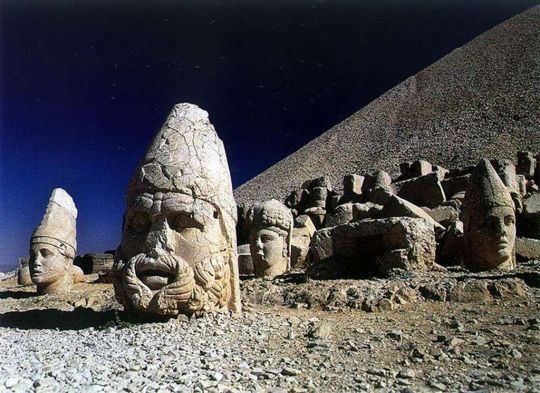

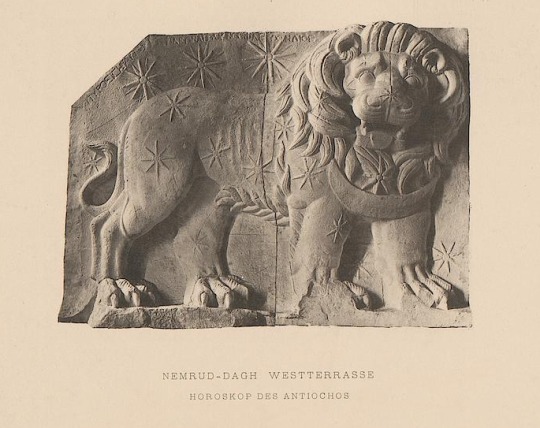
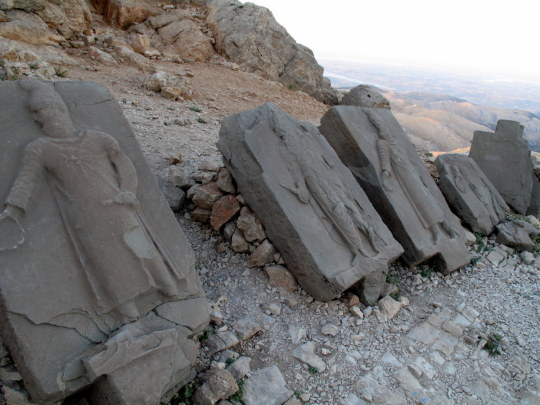
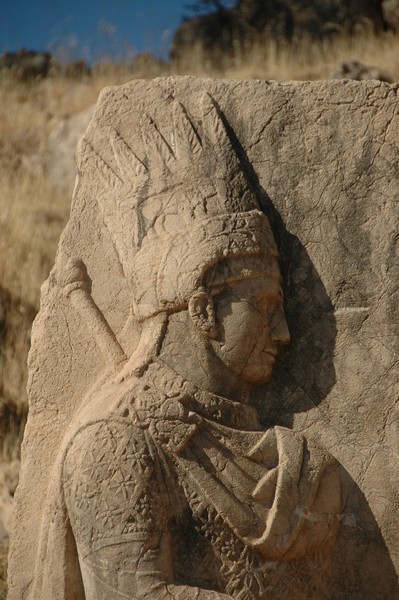
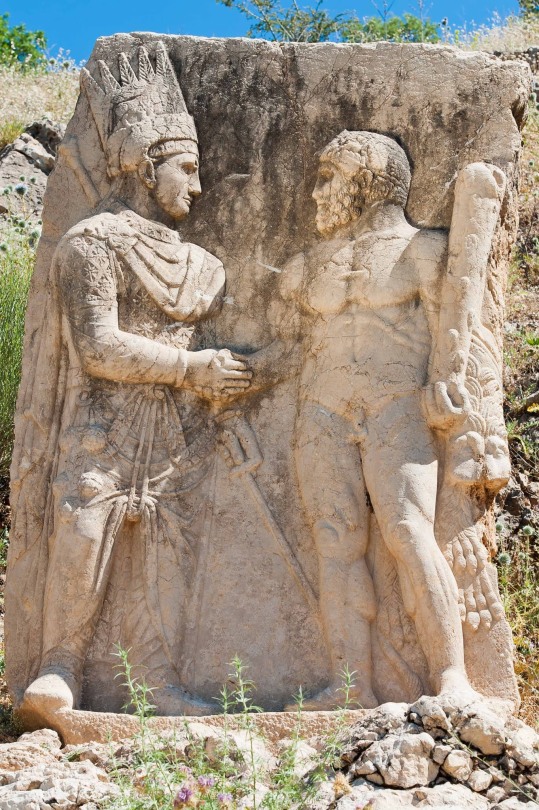
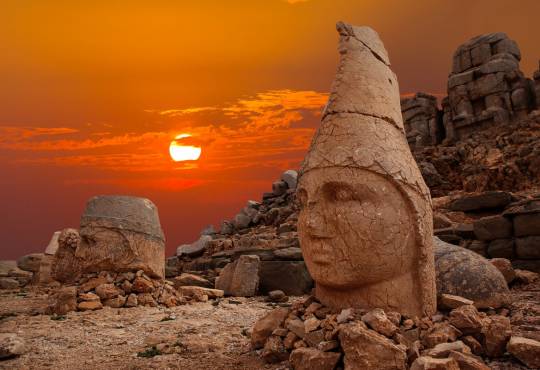
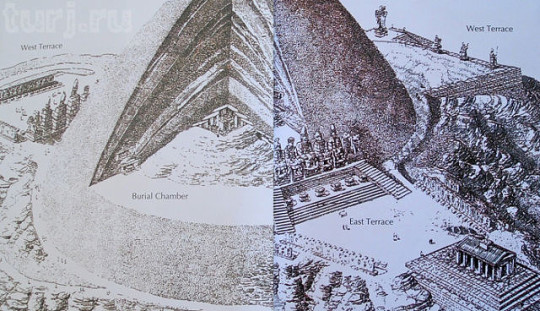
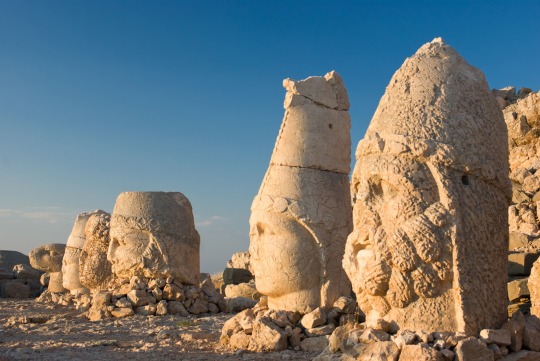
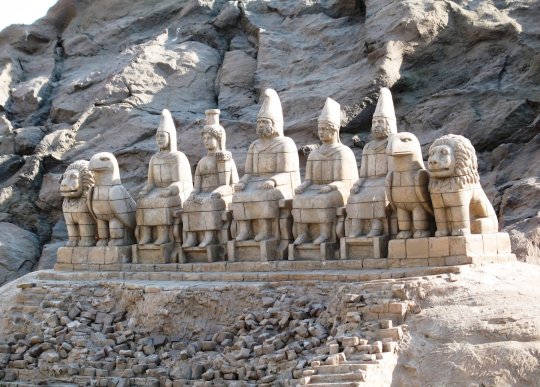
Statues of Mount Nemrut 62 BCE. The bottom picture is an artistic representation of what the monuments would look like restored. Left to right: Apollo, Tyche (fertility Goddess of the Commagene's), Zeus, Antiochus I Theos, and Herakles. The other images are the statues in their current state. The monuments were ordered constructed by Antiochus I Theos of Commagene, who was half Greek half Iranian. There are more images and descriptions on my blog, link at bottom.
"A large inscription is carved into the back of the colossal statues at the East- and West-Terrace. At the back of the Zeus statue, you can read the letters N O M O [ (Nomos). Here, the Holy Law of Antiochos begins. The Nomos of the Nemrud can be regarded as the testament of Antiochos.
...
The Great King Antiochos, the God, the Righteous One, the Manifest (Deity), the Friend of the Romans and the Greeks, the Son of King Mithridates Kallinikos and of Laodike the Brother-loving Goddess, the Daughter of King Antiochos Epiphanes, the Mother-loving, the Victorious, has recorded for all time, on consecrated pedestals with inviolable letters the deeds of his clemency.
I have come to believe that, for mankind, of all good things piety is both the most secure possession and also the sweetest enjoyment. This judgment became, for me, the cause of fortunate power and its blessed use; and during my whole life I have appeared to all men as one who thought holiness the most secure guardian and the unrivaled delight of my reign (or kingdom). By this means I have, contrary to all expectations, escaped great perils, have easily become master of hopeless situations, and in a blessed way have attained to the fullness of a long life. After taking over my father’s dominion, I announced, in the piety of my thought, that the kingdom subject to my throne should be the common dwelling place of all the Gods, in that by means of every kind of art I decorated the representations of their form, as the ancient lore of Persians and of Greeks–the fortunate roots of my ancestry–had handed them down (to us), and honoured them with sacrifices and festivals, as was the primitive rule and the common custom of all mankind; in addition my own just consideration has further devised still other and especially brilliant honors. And as I have taken forethought to lay the foundation of this sacred tomb, which is to be indestructible by the ravages of time, in closest proximity to the heavenly throne, wherein the fortunately preserved outer form of my person, preserved to ripe old age, shall, after the soul beloved by God has been sent to the heavenly thrones of Zeus Oromasdes, rest through immeasurable time,
…. so I chose to make this holy place a common consecrated seat of all the Gods; so that not only the heroic company of my ancestors, whom you behold before you, might be set up here by my pious devotion, but also that the divine representation of the manifest deities might be consecrated on the holy hill and that his place might likewise not be lacking in witness to my piety.
Therefore, as you see, I have set up these divine images of Zeus-Oromasdes and of Apollo-Mithras-Helios-Hermes and of Artagnes-Herakles-Ares, and also of my all-nourishing homeland Kommagene; and from one and the same quarry, throned likewise among the deities who hear our prayers, I have consecrated the features of my own form, and have caused the ancient honor of great deities to become the coeval of a new Tyche. Since I thereby, in an upright way, imitated the example of the divine Providence, which as a benevolent helper has so often been seen standing by my side in the struggles of my reign. Adequate property in land and an inalienable income therefrom have I set aside for the ample provision of sacrifices; an unceasing cult and chosen priests arrayed in such vestments as are proper to the race of the Persians have I inaugurated, and I have dedicated the whole array and cult in a manner worthy of my fortune and the majesty of the Gods. I have decreed the appropriate laws to govern the sacred observances thus established for everlasting, so that all the inhabitants of my realm may offer both the ancient sacrifices, required by age-old common custom, and also new festivals in honor of the Gods and in my honor. The birthday of my natural body, the sixteenth of Audnaios, and the tenth of Loos, the day of my accession to the throne, I have consecrated to the manifestation of the great deities, who were my guides in a prosperous beginning and have been the source of universal blessing for my whole kingdom.
Because of the multitude of offering and the magnificence of the celebration I have consecrated two additional days, each of them as an annual festival. The population of my empire I have divided up for the purpose of these assemblies, festival gatherings, and sacrifices, and directed them to repair by villages and cities to the nearest sanctuaries, whichever is most conveniently located for the festival observance. Moreover, I have appointed under the same title that, in addition to the observance just named, my birth on the sixteenth and my accession on the tenth shall be observed every month by the priests. Now that these regulations have been established, to be observed continually as the pious duty of men of understanding, not only in my honor but also in the blessed hope of their own good fortune, I have, in obedience to the inspiration of the Gods, ordered to be inscribed upon sacred, inviolable stelae a holy law, which shall be binding upon all generations of mankind who in the immeasurable course of time, through their special lot in life, shall successively be destined to dwell in this land; they must observe it without violation, knowing that the stern penalty of the deified royal ancestors will pursue equally the impiety occasioned by neglect as that occasioned by folly and that disregard of the law decreed for the honor of the heroes brings with it inexorable penalties. For the pious it is all a simple matter, but godlessness is followed by backbreaking burdens. This law my voice has proclaimed, but it is the mind of the Gods that has given it authority. NOMOΣ – LAW The priest who is appointed by me for these Gods and heroes, whom I have dedicated at the sacred tomb of my body, on the topmost ridges of the Taurus range, and who shall at a later time hold this office, he, set free from very other duty, shall without let or hindrance and with no excuse for evasion keep watch at his memorial and devote himself to the care and the proper adornment of these sacred images. On the birthdays which I have established forever as monthly and annual festivals of the Gods and of my own person, throughout the whole year he shall, himself decently garbed in Persian raiment, as my benefaction and the ancestral custom of our race have provided, crown them all with the gold crowns which I have dedicated as the sacred honors due the deified ancestors; and out of income from the villages, which I have designated for the sacred honors of the heroic race, he shall offer on these altars rich additional offerings of incense and aromatic herbs, and also splendid sacrifices in honor of the Gods and in my honor,
….. in worthy wise setting up sacred tables with appropriate foods and filling jars from the winepress with precious drink (that is, wine mixed with water). He shall hospitably welcome the whole of the assembled people, both the native and the foreigners who stream hither, and he shall provide for the common enjoyment of the feast by the assembled multitudes, in that, as is the custom, he shall take for himself a portion, as a gift in honor of the priestly office, and then distribute the rest of my benefaction to the others for their free enjoyment, so that during the holy days everyone may receive a never failing sustenance and may thus be able to celebrate the festival without running the risk of malicious calumny. The drinking cups, which I have dedicated, are to be used by them as long as they remain in the holy place and participate in the general assembly for the feast.
The group of musicians whom I have chosen for the purpose and those who may later be consecrated, their sons and daughters, and also their descendants shall all learn the same art and be set free from the burden of every other responsibility; and they are to devote themselves to the observances which I have established to the end, and without any evasion are to continue their services as long as the assembly requests it. No one, no king or ruler, no priest or official shall ever make slaves of these hierodules, whom I have, in accordance with the divine will, consecrated to the Gods and to my own honors, or their children or the descendants of their children, who shall continue their family to all later time; he shall neither enslave them to himself nor alienate them to anyone else in any way, nor injure one of them, nor deprive him of this ministry; but the priests shall take care of them, and the kings, officials, and all private persons shall stand by them, and the favor of the Gods and heroes will be laid up for them as a reward for their piety.
It is equally not permitted for anyone to appropriate or to alienate the villages which I have dedicated to these Gods, to sell them or to devote them to some other purpose, or in any way to injure those villages; or to reduce the income from them, which I have dedicated to the Gods as an inviolable possession. Nor shall anyone go unpunished who shall devise in his mind against our honor some other scheme of violence or of disparaging or suspending the sacrifices and festal assemblies which I have established. Whoever shall presume to rescind or to injure or guilefully to misinterpret the just tenor of this regulation or the heroic honors which an immortal judgment has sanctioned, him the wrath of the daemons and of all the Gods shall pursue, both himself and his descendants, irreconcilably, with every kind of punishment.
A noble example of piety, which it is a matter of sacred duty to offer to Gods and ancestors, I have set before the eyes of my children and grandchildren, as through many other, so too through this work; and I believe that they will emulate this fair example by continually increasing the honors appropriate to their line and, like me, in their riper years adding greatly to their personal fame. For those who do so I pray that all the ancestral Gods, from Persia and Macedonia and from the native hearth of Kommagene, may continue to be gracious to them in all clemency. And whoever, in the long time to come, takes over this reign as king or dynast, may he, if he observes this law and guards my honor, enjoy, through my intercession, the favor of the deified ancestors and all the Gods. But if he, in his folly of mind, undertakes measures contrary to the honor of the Gods, may he, even without my curse, suffer the full wrath of the Gods."
-The Nomos: The Holy Law of King Antiochus I Theos of Commagene
More images (tumblr only lets me upload 10 per post):
https://paganimagevault.blogspot.com/2020/04/statues-of-mount-nemrut-62-bce.html
#greek#ancient greece#iranian#persian#achaemenid#archaeology#zeus#apollo#tyche#herakles#antiochus#nemrut#pagan#european art#art history#antiquities#sculpture#statue#paganism#literature#1st century bce
124 notes
·
View notes
Text
war of hearts | bakugou katsuki
prologue | masterlist
a/n: in lieu of king explosion murder’s big day, i’ve decided to go ahead and publish a fic that’s been gaining dust since last year. hope ya like it!

There was a time in our history, ancient but not yet forgotten, where clans reigned supreme and kingdoms rose from the ashes of an unmitigated anarchy. From them descend the stories of war and chaos we now know today—
“You get the gist,” droned the professor, skipping the lengthy summary as the books were passed around the class. His half mast eyes pinpointed the eagerness of some students and the utter boredom weighing on the faces of others. History was only ever important to a good few, anyway. He still wasn’t sure if he was a fan of it himself, and he was teaching the damn subject.
Grunting under his breath as a hand shot into the air, he relented. The placement of the perfectly poised fingers were familiar. He didn’t need to see their face to know who had a question.
“What is it, Iida?” he called, flipping to his notes on the new topic.
“Sir Aizawa! Am I to assume this is the English-History assignment you and Professor Yamada spoke of last week?”
“Yes.”
Another hand rose, scarred and hesitant, even somewhat quivering as if ready to collapse at a moment's notice if the teacher moved on. He didn’t. He nodded to the timid student of his as the boy met his sunken stare with an inquisitive gaze.
“If this is a double class assignment, does it count as one grade or two?”
“I’m getting to that,” he said, watching Midoriya sink further into his seat, clearly embarrassed, “but glad to see you care. Some of you should be worrying about this with your current grades.”
As Midoriya deflated in relief, his coevals stiffened in fear.
“Here’s the set up,” Aizawa began, making sure all eyes were focused on him before continuing. “This assignment is based on two things: reading comprehension and historical fact. Your job for my class is to pick historical fact from historical fiction as the author we chose caters to students your age and mixes reality with fantasy to spice things up and keep you interested.”
“So the fantasy aspect is for Professor Yamada’s class, then?”
“Raise your hand, Kaminari,” Aizawa warned dryly, “but yes. There are writing styles and whatnot he wants you to learn and take note of throughout the story. Obviously, we are grading you on separate things, so you’ll have two separate grades from this assignment which can help a lot of you who are behind right now. Any other questions before we get started?”
“Do we have to read this trash on our own time?”
“What part of ‘raise your hand’ did you not hear, Bakugou?”
The temperamental student clicked his tongue in annoyance, not bothering to follow the simple command to the rhetorical question.
“No. This is in-class only as there’s just a few weeks left before spring break.”
The rise in the class’s volume after that statement had him wishing it was already here. It had been a long school year. Not the worst class he’s taught, fortunately. He’d never admit it was his favorite to date. Except for that kid, Mineta. Him he could do without for the rest of his days at this institute.
Allowing them to release a modicum of the annoyance that was their youthful energy, Aizawa was soon settling them down with his signature glare. The silent threat of detention—or worse—had everyone shutting their mouths and staring straight.
“Sir? Are there any actually historical figures in this book?”
The professor blinked at a befuddled Midoriya, not surprised he was already flipping through the pages of the novel. That kid had always been fervent in regard to his education.
“Some of the characters have monikers that will help you connect what historical person they’re modeled after, other than that its up to you to know the difference—another reason why we chose this novel. Any more questions?”
Sweet and utter silence. If only he didn’t have a class to teach, then he'd get some shut eye.
“Alright, let's get started then.”
#my hero academia#boku no hero academia#bakugou katsuki x reader#katsuki bakugo x reader#bakugo x reader#bakugo katsuki#bakugou katsuki#bnha x reader#mha x reader#dragon king bakugo#barbarian bakugou#masterlist
133 notes
·
View notes
Note
1) I think it was Plutarch’s account, that after Hephaistion’s and Krateros’s famous clash, Alexander eventually reconciles them by telling them he loved them most of all men. Will you be expanding on Alexander’s and Krateros’s relationship in your future DwtL books? I remember you briefly touched upon them in Rise. Or like, is there any historical evidence that elucidates what their dynamic was like beyond/including the whole philobasileus thing?
Who Was Krateros (and what will I do with him in DwtL)?
I’ve always found it curious that, in most novels about Alexander’s conquests, Krateros tends to be a distant secondary character in contrast to others around Alexander, especially Ptolemy—despite the fact Krateros was more powerful than Ptolemy, and powerful at an earlier date.
I suspect it owes to the fact Ptolemy went on to found a dynasty and write a history. Modern writers feel as if they know him better. By contrast, Krateros died just two years after Alexander. So although he tends to have a better reputation among modern historians (which, I think, is not well-deserved), he’s never really received thorough treatment in much the same way (and for much the same reason) as Hephaistion.
He died too soon to become a major player among the Diadochi. But that means the people we know best from the era of the Diadochi were NOT the most prominent men at Alexander’s court. So don’t be surprised when Krateros pops up as an important secondary figure in the series with a more conspicuous role than Seleukos, or Antipatros, or Antigonos, who all long outlived him.
In part, that importance owes to Hephaistion’s role as protagonist. If pressed to name the chief protagonist of Dancing with the Lion, Alexandros or Hephaistion…it’s Hephaistion.
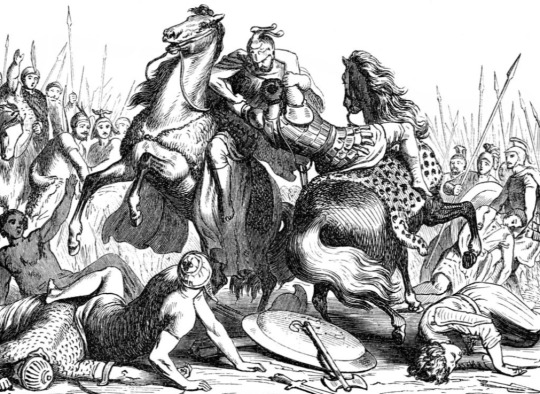
I don’t want to go into too much detail about future plots and spoil it—but if Krateros winds up Hephaistion’s bête noire, he doesn’t start that way. The details of their falling out is a driving point of the Long Plot (e.g., the plot across books, part of the overall tragedy of Alexander’s story). I’ll just say that, when I first saw Hamilton, the Musical, a lot of the Hamilton-Burr dynamic resonated because it reminded me of my vision of Hephaistion and Krateros.
Don’t overextend that, but it gives a general idea.
We have some hints that suggest, at least at first, Hephaistion and Krateros weren’t enemies. They may not have been bosom buddies, but I don’t think they were enemies.
I have a clear personal view of each man, based on the historical texts. Hephaistion’s personality I laid out in the first two novels. He can be touchy about his honor and how he’s viewed, and is 110% loyal to Alexander, but not a suck-up. The two just generally see things the same way, and will continue to do so (except in matters of religion, which does come to a head in one particular event I’ll not spoil). Yet in how to run the empire and how to Persianize the court, they’re on the same page and Hephaistion is deeply involved in court procedural renovations. This accords with what the sources tell us. Hephaistion followed Alexander in the changes, which is typical of how ancient sources would present it. Me, I’d argue he didn’t just “follow,” he helped Alexander come up with it. He understood the problem/hurdle as Alexander did and was a party to the solution of blending the two courts.
My Hephaistion is proud, and wants to be recognized for his contributions and ideas. He resents it when anybody suggests he’s just a “yes-man.” And no, that’s not because they were/are lovers. It’s because sycophancy is an easy way to insult your rival. 😉Nothing makes him angrier than being called a “flatterer.” His friendship with Alexander will go through highs and lows (because that’s human), but he remains mostly certain of his place at Alexandros’s right hand. That doesn’t mean he won’t get jealous, because he definitely has a jealous bone (which I think I pretty clearly established in Rise). Yet as time goes on, he settles down and his clashes with others stem from a failure by those others to recognize his place. Yet he understands his place—and ambitions—differently. He can act jealous and touchy, but not for expected reasons. My Hephaistion (and I stress this is not the historical person) just isn’t that interested in commanding others or occupying high office for itself. The kleos of it: glory He wants to help Alexandros make his new empire work, and gets really impatient with all the other “idiots” who can’t see what needs to be done to achieve that. He has ambition, but it’s north/north-west of typical.
Krateros is also pretty clear in my head, both as a fictional character but also how I think he was historically. He, too, is a deeply ambitious, and very capable. My fictional Krateros’s vicious ambition stems from being the “poor cousin” to Perdikkas and the Orestian royal house, needing to prove his place, not just get it as a right of birth—although he also gets it as a right of birth because he is not a commoner. In short, he has the resentment and envy of second-tier gentry, but the drive to succeed in Philip’s (and then Alexander’s) army where ability is recognized too. (I’d note that, after ATG’s death, Krateros [along with Ptolemy] joined Antigonos’s rebellion against Perdikkas as regent of the kings…which is why he died in battle fighting Eumenes, who was on Perdikkas’s side. Yet this is notable because he was almost certainly from Orestes…and thus, related to Perdikkas. We can debate who was higher born, but I think it was Perdikkas.)
Anyway, Alexandros recognizes both his ability and sympathizes with his drive to succeed because it’s similar to his own: the need to prove himself to his father, as prince.
That’s the fictional background of my Krateros, but the historical man was good at what he did, and knew it, and expected to be recognized for it among his peers: to stand first among them. Ergo, he was viciously competitive to rivals, but charming and charismatic otherwise.
How does that work? To those well above him in the power structure, he’s respectful and seeks their approval in order to receive advancement. So, for instance, he’s devoted to the kings (Philip, then Alexander) because they are Givers of Good Things (promotions, land, loot). He would have been a young officer under Philip, making him roughly the age of Ptolemy, Philotas, Nikanor, Koenos…maybe Kleitos (although I think Kleitos was a bit older), just as Leonnatos, Perdikkas, Seleukos and Hephaistion were coevals of Alexander.
So he couldn’t and wouldn’t challenge the “old men”: Parmenion, Antigonos Monophthalmos, Antipatros, etc. He even seems to have been an understudy to Parmenion. For instance, at Issos, he was in charge not just of his brigade but the whole left wing under Parmenion’s general command. He wanted to impress Parmenion and earn his support—not antagonize him.
Likewise, he had no reason to lord it over his infantry battalion, who would have been no threat to his ambitions. He needed them, in fact. By being chummy with them, he was far more likely to secure their loyalty—not unlike Caesar later.
It was those men who were rivals for positions he wanted who drew his special ire. Krateros would never get Parmenion’s spot while the old man lived, but Parmenion was old. Krateros could wait. After Issos, I expect Krateros saw himself as Parmenion’s natural successor. Yet Krateros was also unlikely to get Parmenion’s spot as long as Philotas lived. If we have only a sketchy idea of ranking order in the army, the whole Philotas Affair tells us/suggests the position of commander of the Companion Cavalry was the #2 position after Parmenion’s slot as viceroy to Alexander. Krateros may have served under Parmenion in charge of the army left side at Issos…but Philotas was still above him in the food chain.
Nikanor (Parmenion’s middle son) may also have been a hurdle, as commander of the Regular Hypaspists (as opposed to Royal Hypaspists), but he was younger than Philotas. Thus, Krateros would have started by removing Philotas, only worrying about Nikanor after—and as it turned out, Nikanor died of disease in late 330, deleting himself from the picture.
Our histories seem united on Philotas as arrogant and pushing his place: an obnoxious little brat, if also a perfectly capable commander. Ergo, Philotas provided Krateros with the perfect target, one unlikely to have staunch defenders.
So Krateros systematically went after him as early as the Egyptian sojourn, and possibly even earlier. Plutarch doesn’t always get things right, so we must be cautious about this, and Badian wanted to make the spying of Krateros part of Alexander’s big conspiracy against Parmenion’s family. Not at all. I think it was Krateros’s attempt to target the man he saw as chief rival.
At that point, Krateros would have regarded Alexander’s cohort as “the boys.” They didn’t have major offices, although were rising to some key junior commands. For instance, Hephaistion apparently commanded the “agema” (later term but good enough for this) of the Hypaspists. That’s the king’s own unit, who acted as his personal bodyguard in battle and actually ran with the cavalry squadron (!, yes in full armor). They would have been composed almost entirely of aristocratic young men: e.g., former Pages. So that’s a plum command for Hephaistion…but he didn’t command a whole SECTION of the army, like Philotas and the Companions.
Hephaistion, Leonnatos, Perdikkas, Seleukos…they weren’t a threat to Krateros. He could be friendly to them, may even have cultivated Hephaistion especially, for his unique access to the king. You may be thinking, Man, he sounds like a user! Well, yes. That’s how the Macedonian court functioned, although I think Krateros was more ruthless, and successful, than most.

Then he got an unexpected gift-horse: the Dimnos Conspiracy and Philotas’s casual (and deeply stupid) dismissal of the warning about it. Krateros went right for the jugular.
I want to make a point that I also made in “Crisis and Opportunity: the Philotas Affair…again.” We absolutely must resist looking backwards from the outcome to ascertain motives. When the scared Pages finally approached Ptolemy, who then went to Alexander and the other Friends, NOBODY knew what the outcome would be. It was not planned. It really was a crisis.
Yet Krateros saw opportunity in the crisis, and as a successful field commander, ran with it. So I see him, not Hephaistion, as the architect of the accusation against Philotas. HE had the most to gain (he thought), and if Plutarch can be believed in this, it wasn’t the first time he’d tried to bring Philotas’s snarky words and bad behavior to Alexander. As alluded to above, he’d paid Philotas’s mistress to report to him what Philotas said during “pillow talk” as early as Egypt. Now it could be (and quite probably was) that he saw Philotas’s bragging and claims to victories as a real threat to the king. (Kinda like shadow presidents in Mar-a-Lago.) People can have more than one motivation. They can even have a “good” motivation (protecting Alexander’s pride and reputation) alongside a “bad” motivation (making Alexander resentful of Philotas). Alexander’s pride was touchy too. 😉 Even if he blew off Krateros’s accusations at the time, we can imagine he was still stung. Seeds successfully planted!
We must, however, be careful not to read the final results back into the assumptions of the people at the time. Hindsight 20/20 and all that. I do NOT think Krateros believed this would result in Parmenion’s removal/death, although I do think he wanted to get Philotas arrested and executed.
Also, I do NOT believe Hephaistion had any idea he was about to be elevated to command of half the Companion Cavalry. He’d have had no reason to think he’d be leapfrogged over older, loyal men, such as Krateros…or Kleitos, who wound up as his co-commander.
Hephaistion’s motivation? Friendship. In “Crisis and Opportunity” I stressed it was friendship to Alexander, but I’ve also come to think that Krateros may have talked him into it, so also friendship, or at least alliance, with Krateros, who knew he could rile Hephaistion’s blood. He wanted that sheen of authentic anger. I want to quickly add that Koenos joined in with the torturers because he feared going down with the ship, as he was Philotas’s brother-in-law.
All this neatly explains why it was Hephaistion to whom Philotas appealed during his torture. Not because he orchestrated it, but because he had the least reason of the three to want Philotas out of the way. He was in it for passion and so, might then be moved to pity. Krateros was all-in from the outset, and Koenos had to be to save his own neck from Philotas’s arrogant stupidity.
So Philotas was convicted, executed, and then Alexander felt he must also execute Parmenion because he was sitting on Alexander’s all-important supply lines during a major operation. That is not a pretty picture and must be acknowledged as much. Philotas Did a Dumb, and lost his life for it. Extreme, but he dug his own grave. Parmenion was flat-out murdered. Realpolitik does not excuse the death of the man who’d sided with Alexander, put him on the throne, then advised him so capably.
In any case, from Krateros’s point of view, this was terrific. Philotas was out of his way, and so was Parmenion. Honestly, I doubt he wanted to see the old man dead instead of honorably retired, but it still cleared the way for him.
Then an astonishing thing happened!
Krateros didn’t get the Companions. Hephaistion did. And Kleitos. Of the younger generation, Hephaistion had just leap-frogged right over the heads of Krateros and all his cohorts. (Again, I think Kleitos was older; there’s no evidence of Krateros being at public odds with him.)
Just imagine how angry Krateros was!
The snotty little upstart! Who the hell did Hephaistion think he was?
So yeah, Krateros got what he wanted: Philotas out of the way. And in the process, he shot himself in the foot.
Plutarch tells us exactly why Alexander made the choice he did: nobody should have that much command authority henceforth, even his best friend. But he did want a man loyal to him in that position. I would not be at all surprised if—crisis past—Alexander recognized Krateros’s maneuvering for what it was…and didn’t indulge him. He wasn’t about to give out promotions for the backstage take-down of a fellow officer.
By the Battle of the Hydaspes against Poros in India (almost three years later), Krateros served the same position as Parmenion: hold the main army while Alexander leads the attack. Yet in between, Alexander had rearranged units. Even the Companions had not only been split, but divided further into six Hipparchies. Hephaistion’s was primary, but only the first of six. He was no longer overall commander. And that would have happened had Kleitos lived or died, as Kleitos had been reassigned as satrap in Baktria. Dividing the Companions had just been the initial sally to a more comprehensive reorganization and power redistribution.
Ergo, if Krateros had power, it would never be equal to Parmenion’s, and it seems to have been deliberately delayed after the Philotas Affair. Krateros dared not get mad at Alexander. Again, as king, Alexander is above these status wars, and the Giver of Good Things.
Another complication for Krateros: Parmenion’s death had angered Parmenion’s loyal men, some of whom Krateros had commanded…and Krateros had been part of Parmenion’s downfall, however indirectly. Wouldn’t it be convenient if he could shift the blame to Hephaistion?
So Hephaistion was now the chief man “in his way.” Plus (fair or not) Krateros resented him for getting the plum assignment, may have convinced himself that Hephaistion used the opportunity to sweet-talk Alexander into giving it to him. Even if he didn’t believe that, he could still have spread the rumor. It was advantageous, displacing soldier’s anger over Parmenion’s death onto Hephaistion. And it would rile up his own battalion/soldiers with indignation on his behalf.
“Stop the steal!” *smirk*

It all exploded in India. We’re not told when, but I suspect sooner rather than later—before the Malian catastrophe. My best guess is after the Hydaspes, possibly while everyone was relaxing for a while in Poros’s kingdom. Bored soldiers are gossipy soldiers, and get restless and pick fights.
Gregor Weber in his analysis “The Court of Alexander the Great as Social System” (Alexander the Great: a new history, 2009) suggested that Alexander encouraged such rivalry among his Hetairoi and Friends, and uses the H. and K. squabble as a peak example. To some degree, that’s true. Competition was endemic to the Macedonian court because it was endemic (maybe EPIDEMIC) to Greek society more broadly. Macedonian kings (not just Alexander) would have encouraged competition as a way of choosing the best officers. The Hetairideia I described in Dancing with the Lion—the Festival of the Companions with competitions—was a real thing. I made up a lot of the details, but we hear about it under the Antigonids, by which time it involved mock battle. But it was said to have been much older. There very well may be ties between the Hetairideia and the original Macedonian “Olympics” at Dion. E.g., the latter may have grown out of the former, but it’s all too vague to know.
Anyway, competition was natural and encouraged at court, but I disagree with Weber about Alexander encouraging THAT particular competition between Hephaistion and Krateros. Weber reads the clever “philobasileus/philalexandros” as encouraging. I see it (and Plutarch’s wording suggests) just the opposite. He was trying to lower the temperature in the room. It didn’t work.
We simply aren’t told enough about the swords-drawn brawl to understand what led up to it. E.g., who started it, as Alexander put it. I don’t mean (and don’t think Alexander meant) who pulled his sword first. He meant who STARTED it. I tend to read that “I’ll kill you both, or at least the one who started it,” as a veiled threat to Krateros. He would have damn well known who started it. He was telling Krateros in that public reconciliation, “Knock it off, dickhead, or else.” And I expect that’s also what he told him in their private meeting/confrontation.
There is more to this, but I’ve said all I want to, for the moment. Again, I’m working on Krateros and Hephaistion at present for a book chapter in a collection, and I’ll also be doing more on them both for a monograph. So I’ll just end with my take on the Indian conflict.
#asks#Krateros#Craterus#Hephaistion#Hephaestion#Alexander the Great#Macedonian history#Macedonian court#Craterus and Hephaestion#Krateros and Hehaistion#Greek history#Classics#Tagamemnon
48 notes
·
View notes
Note
How old are the 104th squad and the veterans?
ok, kids are 15-16 in the beginning of the manga and after times skip they're like 19-20? with veterans, though, it gets a little more tricky. as far as i'm aware, they do not have a confirmed age, but i've read somewhere that erwin was in his late thirties? and levi in his early thirties? so it makes erwin, what? 37-38 years old? and levi's like 33-34? and after time skip, he's maybe 38 years old (grandpa👎). and i think, mike is older than erwin? maybe 40 years old? (again, i'm not sure if that's really canon, i've read it on wiki, i guess?). i don't remember reading anything about hange's age, but i hc that they're maybe 27 years old? and after time skip she's like 31? but it's definitely not confirmed. as for nanaba, i think she is hange's coeval? and, i guess, moblit's a little bit younger? like 25 years old? anyways, i might be totally wrong, so correct me if i am, please ;)
20 notes
·
View notes
Text
Lisowicia bojani

By Scott Reid
Etymology: From Lisowice
First Described By: Sulej & Niedźwiedzki, 2019
Classification: Biota, Archaea, Proteoarchaeota, Asgardarchaeota, Eukaryota, Neokaryota, Scotokaryota Opimoda, Podiata, Amorphea, Obazoa, Opisthokonta, Holozoa, Filozoa, Choanozoa, Animalia, Eumetazoa, Parahoxozoa, Bilateria, Nephrozoa, Deuterostomia, Chordata, Olfactores, Vertebrata, Craniata, Gnathostomata, Eugnathostomata, Osteichthyes, Sarcopterygii, Rhipidistia, Tetrapodomorpha, Eotetrapodiformes, Elpistostegalia, Stegocephalia, Tetrapoda, Reptiliomorpha, Amniota, Synapsida, Eupelycosauria, Sphenacodontia, Sphenacodontoidea, Therapsida, Eutherapsida, Neotherapsida, Anomodontia, Chainosauria, Dicynodontia, Therochelonia, Bidentalia, Dicynodontoidea, Kannemeyeriiformes, Stahleckeriidae, Placeriinae
Status: Extinct
Time and Place: Approximately between 208 to 215 million years ago, in the late Norian to possibly the earliest Rhaetian of the Late Triassic
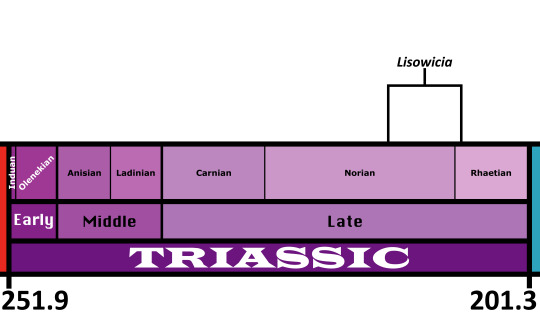
Lisowicia is known from the Lipie Śląskie clay−pit near Lisowice, Poland, as well as possibly other coeval sites in Poland

Physical Description: Lisowicia was a very large dicynodont. In fact, with an estimated length of more than 4 metres, a hip height over 2 metres, and an average body weight of 5.88 tons (and possibly up to 7 tons), it was the largest non-mammalian synapsid period, and would be the largest synapsids would ever grow to until the Eocene after the non-avian dinosaurs died out. By and large (ha!), Lisowicia resembles other closely related Triassic dicynodonts like Placerias; it was heavily built with a large barrel-shaped torso and short, stocky legs, a short stubby tail and a large head with a relatively long snout and a tortoise-like beak. Lisowicia was apparently tuskless, like some other Triassic dicynodonts, meaning that it was entirely toothless.
Lisowicia is not only distinctive for its massive size, but also for the design of its limbs. Most dicynodonts had either fully sprawled limbs, or upright hindlimbs and sprawling forelimbs as is the case for larger dicynodonts. Uniquely for dicynodonts, and for any stem-mammal for that matter, Lisowicia had an entirely upright stance with all four limbs being fully erect, holding them directly under its body and swinging them forwards and backwards when moving, like the legs of modern large mammals and dinosaurs. These column-like limbs are no doubt an adaptation for growing to such a massive size, as such limbs are necessary to support large body sizes in land animals, and in the Late Triassic only some sauropodomorph dinosaurs rivalled it in size. This involved not only changes to the orientation of the forelimb, but also changes to the shoulders, shortening of the forearm, and completely rearranging the musculature of the forelimbs in a way no other dicynodont is known to have done. Based on the footprints of other related dicynodonts, the feet of Lisowicia would have been very elephantine in appearance. Like elephants, they would have walked on the tips of the toes with a large fleshy pad underneath the heel to cushion the feet and support its weight. Basically, almost everything about Lisowicia was built to support a massive body size.
The outside appearance of Lisowicia is unknown, and the appearance of most stem-mammals in general is poorly understood. It’s possible it was covered in scales, had naked skin, or even hair, or maybe it had some other unknown structures. If it was anything like large herbivorous dinosaurs and mammals though, it may have been mostly naked anyways.
Diet: Lisowicia was a herbivore, browsing on low and mid-level vegetation using its long snout and toothless beak to crop and chew plants. Remarkably, coprolites attributed to Lisowicia can tell us what they were eating! Lisowicia appears to have mostly preferred eating softer vegetation, along with conifers, and in some cases they even supplemented it with pieces of wood! It’s possible this was a seasonal thing, feeding on tougher, fibrous vegetation during harder times.
Behavior: Like other large herbivores, Lisowicia may have been a herd animal based on fossil sites with multiple individuals preserved together, including adults and juveniles mixed together. Whether this means Lisowicia practised parental care is uncertain though, as it is with most other stem-mammals. Stem-mammal reproduction is poorly understood, but it’s at least probable that they laid eggs, and that includes Lisowicia. Other possible line of evidence for Lisowicia being social could be that they congregated in a specific place to defecate, called communal latrines. Hundreds of coprolites are known from where Lisowicia was first found, and other dicynodonts like Dinodontosaurus are known to have performed similar behaviour, so it’s possible Lisowicia did this too.
Ecosystem: The ecosystem in Late Triassic Poland is rather unusual, as it includes a mix of plants and animals that make it difficult to pin down just how old it really was. Some suggest an older Norian age, others seem more like they’re from younger Rhaetian ecosystems, and it’s still a bit of a mystery to what was going on in this environment compared to the rest of Europe at the time. In any case, the environment where Lisowicia was found was fairly wet and lush, an “everglades-like” swamp dominated by several types of conifers, alongside gingkos, cycads, seed ferns and liverworts. Lisowicia was one of the most common animals in this environment, but it coexisted with a wide variety of other animals. One of the most notable is the predatory archosaur Smok. Smok was the arch predator in this ecosystem, and is known to have directly fed upon Lisowicia, although whether they were actively hunted by it or just scavenged upon is unknown. Smok was certainly capable of crushing even the heavyset bones of Lisowicia, with not only bite marks on its bones attributed to Smok but even broken shards of its bones identified in Smok coprolites! Other reptiles that coexisted with Lisowicia included pterosaurs, dinosauromorphs and predatory theropods similar to Coelophysis or Liliensternus, a small predatory crocodylomorph, and small diapsids, including a sphenodont (a tuatara relative), a possible archosauromorph, and even a possible choristodere. The only other synapsid around was the little mammaliaform cynodont Hallautherium, which was many times smaller than the gigantic Lisowicia. There were also temnospondyl amphibians, including a large predatory capitosaur and a small plagiosaur (one of those very flat temnospondyls with the wide heads), as well as lungfish, coelacanths and even a hybodont shark. Notably, there are no sauropodomorphs known from this ecosystem, even though they were clearly already present in Europe at this time (e.g. Plateosaurus). It’s possible that Lisowicia occupied their role as a giant herbivore in their absence, although whether it had outcompeted them or just happened to live in a habitat without sauropodomorphs and got big is yet another mystery.
Other: In addition to achieving a size and stature amongst synapsids that wouldn’t be seen again until the mammals radiated during the Cenozoic, Lisowicia was also unique for how it grew. While some stem-mammals are known to have grown rapidly as young juveniles, Lisowicia is the only one known so far to never slow down its growth rate at all until adulthood. This type of continuous rapid growth is well known in dinosaurs and mammals, but is unique to Lisowicia amongst dicynodonts. Lisowicia is one of the most unique dicynodonts ever discovered, both as the largest and one of the most derived. It was also sadly one of the last. The cause of its—and all the other Late Triassic dicynodonts’—extinction is unknown, although it was probably a victim of the end-Triassic extinction event like so many other prominent Triassic animals. Late Triassic dicynodonts were once thought to be geographically restricted, left-over relicts from the past that eventually just fizzled away as “more advanced” animals pushed them out. But now we know that they were still globally widespread even in the latest Triassic, including in Europe with advanced forms like Lisowicia. Competition with sauropodomorphs was suspected, but the discovery of the related dicynodont Pentasaurus coexisting with sauropodomorphs in South Africa suggests they were capable of at least living together, and Lisowicia is proof dicynodonts could achieve similarly gigantic proportions. Ultimately, the extinction of the dicynodonts is a mystery, but Lisowicia shows that they were still getting bigger and better than ever, even at the end of their dynasty.
~ By Scott Reid
Sources under the Cut
Bajdek, P., Owocki, K. and Niedźwiedzki, G., 2014. Putative dicynodont coprolites from the Upper Triassic of Poland. Palaeogeography, Palaeoclimatology, Palaeoecology, 411, pp.1-17
Dzik, Jerzy; Sulej, Tomasz; Niedźwiedzki, Grzegorz (2008). "A Dicynodont-Theropod Association in the Latest Triassic of Poland". Acta Palaeontologica Polonica. 53 (4): 733–738
Fiorelli, L.E., Ezcurra, M.D., Hechenleitner, E.M., Argañaraz, E., Taborda, J.R., Trotteyn, M.J., Von Baczko, M.B. and Desojo, J.B., 2013. The oldest known communal latrines provide evidence of gregarism in Triassic megaherbivores. Scientific reports, 3, p.3348
Kowal-Linka, M., Krzemińska, E. and Czupyt, Z., 2019. The youngest detrital zircons from the Upper Triassic Lipie Śląskie (Lisowice) continental deposits (Poland): Implications for the maximum depositional age of the Lisowice bone-bearing horizon. Palaeogeography, palaeoclimatology, palaeoecology, 514, pp.487-501
NIEDŹWIEDZKI, G., GORZELAK, P. and Sulej, T., 2011. Bite traces on dicynodont bones and the early evolution of large terrestrial predators. Lethaia, 44(1), pp.87-92
Romano, Marco; Manucci, Fabio (14 June 2019). "Resizing Lisowicia bojani: volumetric body mass estimate and 3D reconstruction of the giant Late Triassic dicynodont". Historical Biology. 0: 1–6
Qvarnström, Martin; Ahlberg, Per E.; Niedźwiedzki, Grzegorz (2019). "Tyrannosaurid-like osteophagy by a Triassic archosaur". Scientific Reports. 9
Sulej, T., Bronowicz, R., Tałanda, M. and Niedźwiedzki, G., 2010. A new dicynodont–archosaur assemblage from the Late Triassic (Carnian) of Poland. Earth and Environmental Science Transactions of the Royal Society of Edinburgh, 101(3-4), pp.261-269
Sulej, T. and Niedźwiedzki, G., 2019. An elephant-sized Late Triassic synapsid with erect limbs. Science, 363(6422), pp.78-80
Świło, M., Niedźwiedzki, G. and Sulej, T., 2013. Mammal-like tooth from the Upper Triassic of Poland. Acta Palaeontologica Polonica, 59(4), pp.815-821
#Lisowicia#Dicynodont#Triassic March Madness#Palaeoblr#Synapsid#Lisowicia bojani#Triassic Madness#Prehistory#Paleontology#Prehistoric life#Mammal-like reptile#Stem mammal
218 notes
·
View notes
Text
Paper summary: Harrell et al., (2016). Endothermic mosasaurs? Possible thermoregulation of Late Cretaceous mosasaurs (Reptilia, Squamata) indicated by stable oxygen isotopes in fossil bioapatite in comparison with coeval marine fish and pelagic seabirds.
[This paper is freely available, by the way!]
Hi all! This is the first in a new weekly series I’m going to be doing, in which I will be doing a short paper review each Thursday. We’re starting off big this week, with a delve into the world of stable isotopes.
But Hayley, you say, what in the world are stable isotopes?
Okay, time for some backstory!
The part with the backstory
Isotopes, as you may be aware, are atoms of the same element that have different numbers of neutrons, and therefore different atomic weights. If you think back to chemistry class, or forward to chemistry class if you haven’t taken it, in which case this might help you get a leg up, you’ll remember or just be learning that each element is defined by the number of (positively charged) protons in its nucleus. So each atom of carbon has 6 protons, and if it has more or less, then that’s a problem, because then it’s not carbon. But within the same element they can vary in numbers of (neutral) neutrons. Neutrons are important for holding together an atom’s nucleus, because if you get a bunch of positive charges together in a nucleus they start to repel, just like if you get a bunch of elementary school-aged children together. Different isotopes act basically the same, and I can guarantee you that right now some of the carbon atoms you are using in your body have six neutrons, some have seven, and some have eight. These are referred to as carbon-12, carbon-13, and carbon-14, respectively, and that number refers to the number of (protons+neutrons) in the nucleus. [Sometimes some isotopes are unstable and undergo radioactive decay. Carbon-14 does this. But that’s not really relevant to what we’re doing today.]

(Image: This is a carbon-12 atom. The yellow and red bits in the middle are the protons and neutrons. Not remotely to scale.)
Different isotopes of the same element act mostly the same (besides sometimes being radioactive and going berserk), so animals can take them up and use them. But they don’t act entirely the same, and that information can be used by palaeontologists to learn really cool stuff about past life.
A big thing that isotopes can do differently is something called mass-dependent fractionation. That’s fancy-people-speak for “it’s easier to move things that are less heavy”, and it means that it’s easier to move things that are less heavy.
One useful aspect of this deals with oxygen isotope fractionation. You are breathing oxygen as you read this, and if you are not then you will not likely be reading this for very much longer. Oxygen is also present in water, though, and water covers 70% of the Earth’s surface and makes up 70% of your body. It’s kind of a big deal, if you’ve never heard of it, and for our purposes it comes in two main flavours - water with oxygen-18, and water with oxygen-16.
Oxygen-16 makes up 99.76% of all oxygen on earth, and oxygen-18 makes up 0.2% (the rest is oxygen-17, which no one cares about). This means that about 0.2% of water is heavier than the rest of water. This water is harder to move, because it’s heavier, and when evapouration occurs, oxygen-16 is more likely to evapourate because it takes less energy to move it.
But wait! Putting in more energy makes it easier to move heavy things, and this is exactly what happens. If temperatures are warmer, more oxygen-18 gets evaporated than does at colder temperatures.
We need something to compare this to, because otherwise we’d just be measuring samples and it’d be hard to know what different numbers are referring to. For oxygen, we use the standard of Vienna Standard Mean Ocean Water, or V-SMOW. It’s not super important to know what that is.
What is important is delta notation: δ18O (delta-eighteen-O) refers to how different the ratio of oxygen-18/oxygen-16 is from the standard. We use the symbol ‰, “per mil”, which is fancy people talk for 0.1%, for this, because the differences are really little. +1‰ means that there’s 0.1% more oxygen-18 in the sample than normal - that is, it’s 0.1% “heavier” than normal water.
So, to get that all neatly said: Higher temperatures = More heavy water evapourates = the water that is left behind is lighter.
The part with the actual paper
Oh yeah, the paper! That’s why we were here. Okay, so mosasaurs were a group of big marine lizards (not dinosaurs) in the Cretaceous period. I wrote a little about them here. They looked kinda like this, and could get up to 17m/55ft long.

(Image: A mosasaur, a streamlined marine reptile with a large head, flippers, and a vertical tail fin. Image by Dimitry Bogdanov.)
Being lizards, mosasaurs have been traditionally thought to be cold-blooded - perhaps a reasonable assumption, as all living lizards are cold-blooded. However, it has been suggested various times in the literature as well as informally that mosasaurs may have been warm-blooded, owing to their assumed ecology as fast-moving pursuit predators and the fact that other marine reptiles have been demonstrated to be warm-blooded.
In order to quantitatively test this, teeth from three species of mosasaur from the Mooreville Chalk in Alabama were collected and analysed to find the isotopic composition of oxygen. We need a control sample, though, to ensure that some geological process or change in atmospheric oxygen won’t mess up our data by adding or removing some heavy oxygen. In order to do this, the authors also tested samples from fish, turtles, and aquatic toothed birds that lived at the same time and place. That way they could place the mosasaur fossils in a reliable context.
And the results they found are really interesting!

(Image: a graph showing δ18O values of different fossils from the Mooreville Chalk. I’ll do my best to explain what’s going on in the following paragraphs.)
Okay, so first things first. The fish and turtles tested have very similar δ18O values to each other. They both fall around the +21.2 to +22.0‰ range, or 2.12% to 2.2% heavier than “normal” water (because the “lighter” water has evapourated and left). This corresponds to a temperature of about 26-29°C (79-84°F). This is consistent with estimates of the temperature of the formation. This is what we expect from cold-blooded animals. Good! The method works!
Okay, next step. We can pretty safely assume that these birds were warm-blooded, and thus had a higher body temperature than their environment. Those tested had a δ18O value of about +18.5 to +19.5‰. That’s still heavier than normal water, but it’s less heavy than the cold-blooded animals (because the higher body temperatures led to more of the “heavy” water evapourating and leaving the body). This corresponds to body temperatures in the range of 36-39°C (97-102°F). This is right in the range of modern warm-blooded animals, and it’s another verification that the method works.
Okay, so what do the data say about mosasaurs? Well, it’s kind of a broad scatter. The δ18O values of the samples fall in the range of +19 to +21‰, which corresponds to a range 30-38.5°C (86-101°F). In other words, we’re getting body temperatures that are consistently warmer than the environment or cold-blooded animals, and in some cases are as warm as birds from the same environment!
What can we conclude from this? We can conclude that mosasaurs were probably warm-blooded, or, from the fact that some fall between the two, maybe “lukewarm-blooded” (which I wrote a bit about here). Either way, don’t think you’re safe just because it’s cold.
166 notes
·
View notes